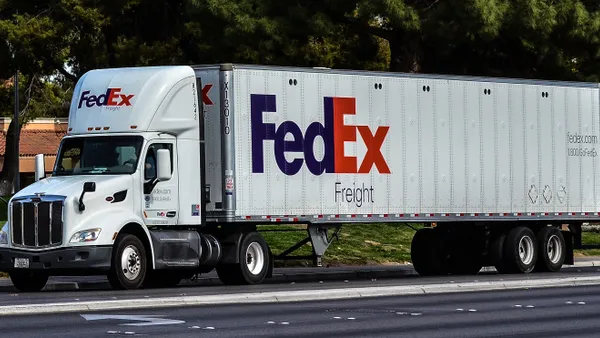Dive Brief:
- Amazon has hired 200,000 employees to help cover peak season, an Amazon spokesperson confirmed to Supply Chain Dive.
- "[T]he growth this year is attributed to the growing number of building types and breadth of seasonal roles across fulfillment, sortation and delivery," the spokesperson said in an email.
- The e-tailer has also built out its fleet of tractor-trailers to reach 20,000 this year, according to Geek Wire. This is double the number of tractor-trailers the company had on the road during the 2018 peak season, according to the report. Amazon did not specify the breakdown of trucks and trailers.
Dive Insight:
This will be an important peak season for Amazon to demonstrate its ability to handle one-day shipping under the weight of holiday volume.
"I think One Day should help with holiday shipping," Amazon CFO Brian Olsavsky said on the company's most recent earnings call in October.
Amazon's staff and fleet buildup come in a year when the retail industry is forecasting a 3.8% to 4.2% increase in holiday spending compared to 2018.
But Amazon's buildup far outnumbers some of its largest competitors who are also scaling up operations to deal with the annual uptick in volume. UPS brought on 100,000 workers for peak season, FedEx announced plans to hire 55,000 extra workers and Target planned to hire 130,000 seasonal employees this year.
Amazon says its growth is the result of the number of building locations it now has in its network. This has been an important part of moving to one-day shipping for the company. More locations for inventory allow the company to position it closer to customers, but this does come at a price. Olsavsky noted the company's shipping cost has increased by $1.5 billion year-over-year heading into the fourth quarter. Most of this has been the result of building out its transportation network, but it also includes more shifts at warehouses and the cost of getting inventory closer to consumers, he said.
Other retailers, like Target and Walmart, rely on third-party logistics companies to help with many aspects of transportation and fulfillment. Many of Target's season hires will be focused on in-store fulfillment this year. Amazon, meanwhile, has been shouldering more of this responsibility on its own in recent years. It ended its relationship with XPO last year and now handles more than 40% of its own last-mile deliveries. This shift could help to explain the company's large number of seasonal hires.
Amazon's operations unit consists of people who pick, pack, ship, sort and deliver orders and the company both growing the operation and promoting workers already on board. The company announced recently that 19,000 people were promoted to managerial or supervisory roles this year.















